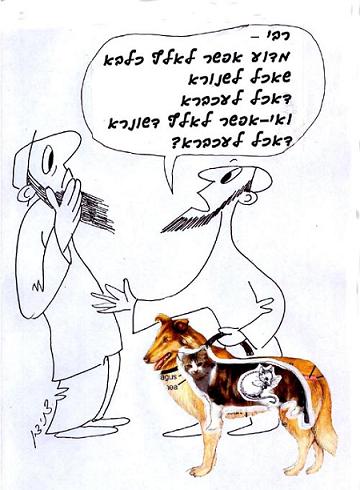
The scholars asked Rabbi Elazar: Why does the dog heed his master (he can be trained) but the cat does not? Answer: One who eats from what the mouse eats forgets what he has learned. The cat, which eats the mouse itself, will certainly forget its master and its training. The scholars then asked their teacher Elazar: Why are mice chased by all other animals? Answer: Because mice are evil natured and their conduct is despicable. The scholars asked: How does their evil behavior find expression? The sage Rava answered that they eat clothing though they cannot use them as food. Another sage, Rav Papa, gave another example: They eat the wooden handle of the hoe.
The early sages also taught which items cause one to forget one’s studies: One who eats from what mice or cats ate, one who eats the heart of an animal, or eats many olives, drinks bath water, or one who washes his feet while they are resting one upon the other. Some sages add that one who places his clothing beneath his head will forget his studies. The sages also taught that there are foods which cause one to recall his forgotten studies: One who eats bread baked upon coals and one who eats coals themselves, one who eats a hard boiled egg without salt, one who frequently uses an olive oil dip, one who drinks wine and smells perfume, and one who drinks water used for kneading dough. Some sages add that one who dips his finger in salt and eats it recalls his forgotten studies. The sage Reish Lakish set limits to that ruling and said that it only works if one dips a single finger in salt and eats it; if he dips two fingers in salt and eats it he will not remember his forgotten studies. The early sages (Tanaaim) also disagreed on the matter. According to the sage Rabbi Judah, it works if he dipped one finger but not if he dipped two, while according to the sage Rabbi Yossi, it works if he dipped two fingers, but not if he dipped three. The sages added that there are ten things people do which makes them have difficulty understanding their studies: passing under a strap tied to a camel, passing under the camel itself, passing between two camels, passing between two women, a woman passing between two men, smelling the scent of an animal which died on its own, passing under a bridge beneath which no water had flowed for 40 days, eating a piece of bread which was not properly baked, eating food left over on the kitchen spoon used to stir the pot, drinking from a ditch which passes through a cemetery, and looking at the face of a dead person. Some of the scholars added that one who reads what is written on a tombstone has difficulty understanding his studies.
(Babylonian Talmud, Tractate Horayot 13a-b)
